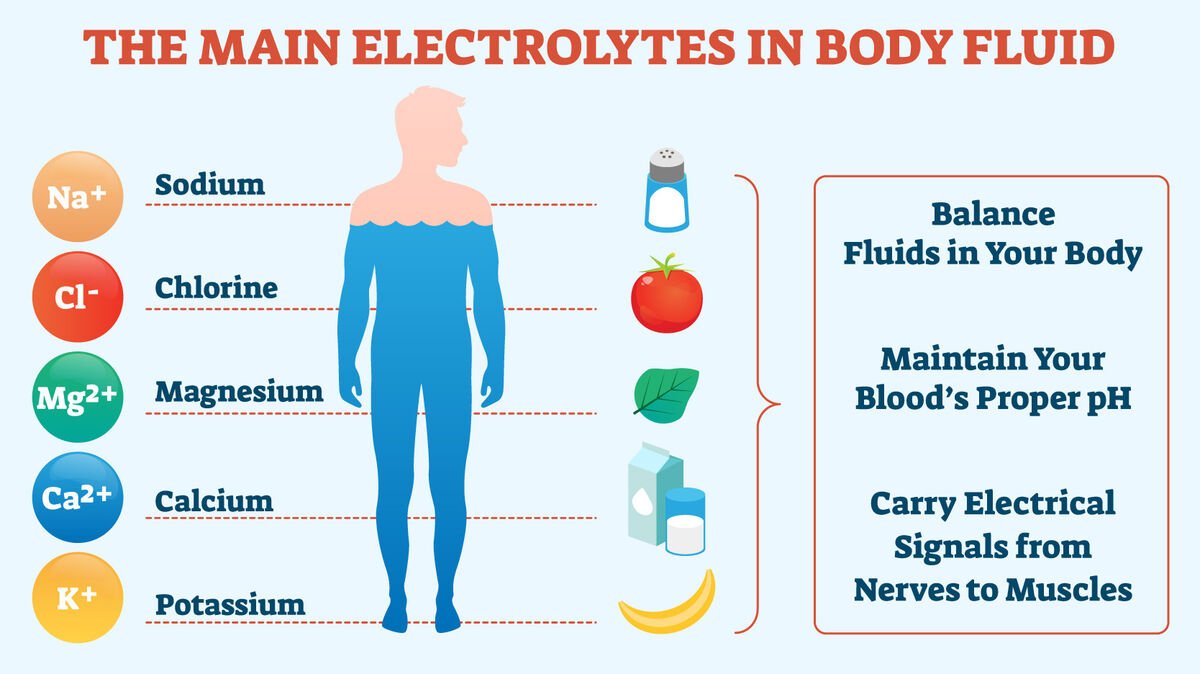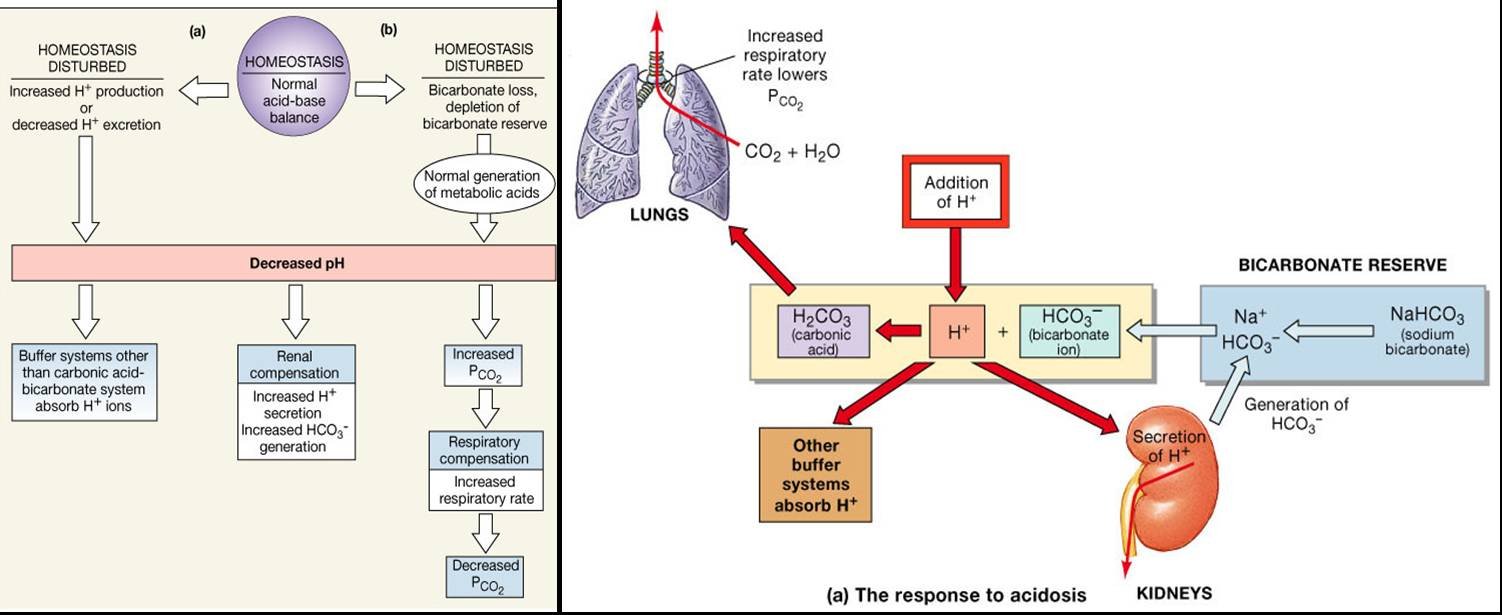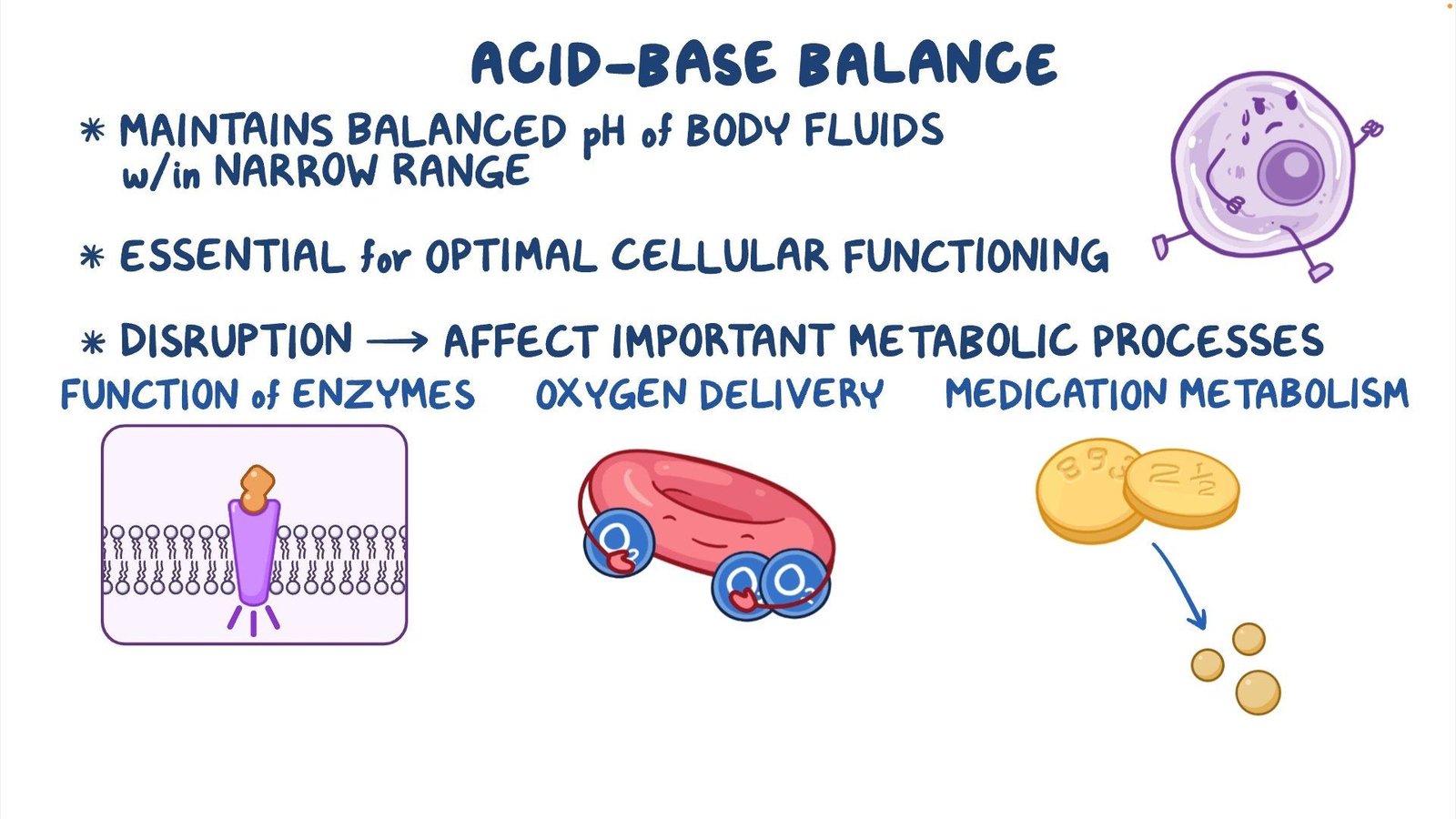Today our topic of discussion is ” Electrolyte Balance “. Electrolytes are minerals in your blood and other body fluids that carry an electric charge. They affect the amount of water in your body, the acidity of your blood (pH), your muscle function, and other important processes. The balance of electrolytes in our bodies is essential for the normal function of our cells and our organs. The primary electrolytes found within the body include sodium, potassium, calcium, magnesium, chloride, phosphate, and bicarbonate.
Electrolyte Balance : Fluid, Electrolyte, and Acid-Base Balance
Importance of Electrolyte Balance
Electrolyte balance is critical to many bodily functions. For example, electrolytes:
- Regulate fluid levels: Electrolytes attract water, and the water follows the electrolytes through the body. This helps maintain fluid balance within cells and in the blood.
- Ensure muscle function: Muscles require certain electrolytes, like calcium, sodium, and potassium, to trigger muscle contractions. A muscle needs calcium to contract and magnesium to relax.
- Stabilize the nervous system: Electrolytes assist in the conduction of electrical signals from the nerves that control bodily functions, including brain function.
- Maintain acid-base balance: The body’s pH level, which measures acidity and alkalinity, is tightly regulated. Electrolytes, particularly bicarbonate, help keep the body’s acid-base balance at the correct level.
The importance of electrolyte balance cannot be overstated. It is critical to the maintenance of fluid balance, nerve conduction, muscle contraction, vascular tone, and the regulation of cellular metabolism.

Mechanisms of Electrolyte Balance Regulation
Kidney Function
The kidneys are the primary regulators of electrolyte balance in the body. They filter the blood, remove excess electrolytes and waste products, and reabsorb electrolytes and water as necessary to maintain balance. This is achieved through various processes including filtration, reabsorption, secretion, and excretion.
Hormonal Control
Several hormones help regulate electrolyte balance:
- Antidiuretic hormone (ADH), also known as vasopressin, conserves water in the body by reducing urine output, which in turn affects electrolyte concentration.
- Aldosterone, a hormone secreted by the adrenal glands, prompts the kidneys to retain sodium and water and to excrete potassium, thereby influencing blood pressure and fluid balance.
- Parathyroid hormone (PTH) regulates calcium levels by influencing the bones, kidneys, and intestines to either store or release calcium.
- Atrial natriuretic peptide (ANP), released from the heart, can counteract aldosterone to reduce sodium and water reabsorption when there is excess blood volume.
Dietary Intake
The food and beverages we consume are the main sources of electrolytes. Maintaining a balanced diet is fundamental to ensuring an adequate supply of electrolytes for the body’s needs.
Cellular Mechanisms
Cells maintain electrolyte balance through active transport mechanisms, like the sodium-potassium pump, which uses energy to move sodium out of cells and potassium into cells against their concentration gradients.

Electrolyte Imbalance and Its Consequences
Hypernatremia and Hyponatremia
- Hypernatremia refers to high levels of sodium in the blood and is often due to dehydration or excessive sodium intake.
- Hyponatremia indicates low sodium levels and can be caused by overhydration, kidney failure, or other conditions.
Both can cause neurological symptoms due to the effect on cellular water balance and nerve function. In severe cases, they can lead to seizures or coma.
Hyperkalemia and Hypokalemia
- Hyperkalemia is an excess of potassium in the blood and can affect cardiac function, potentially leading to life-threatening heart rhythm problems.
- Hypokalemia denotes a deficiency of potassium and can cause muscle weakness, cramps, and fatigue.
Hypercalcemia and Hypocalcemia
- Hypercalcemia is characterized by an elevated level of calcium in the blood, which can result in kidney stones, bone pain, and cardiac issues.
- Hypocalcemia represents low calcium levels, leading to muscle spasms, tetany, and, over time, osteoporosis.
Magnesium Disorders
- Hypermagnesemia and hypomagnesemia can impact muscle and nerve function and are associated with various other electrolyte imbalances since magnesium plays a role in their regulation.
Chloride Imbalances
Chloride usually follows sodium and helps maintain osmotic pressure, acid-base balance, and fluid distribution. Abnormal levels can affect blood pH and pressure.
Phosphate and Bicarbonate Imbalances
These are closely related to calcium levels and acid-base balance. Disturbances can result in weak bones, muscle dysfunction, and altered pH balance.

Diagnosis and Treatment of Electrolyte Imbalance
Electrolyte imbalances are diagnosed through blood and urine tests. Treatment may involve dietary changes, supplements, intravenous fluids, and addressing the underlying causes.
Diet and Nutrition
Diet plays a significant role in maintaining electrolyte balance. Foods rich in potassium include bananas, potatoes, and spinach. Dairy products and green leafy vegetables provide calcium. Table salt is the most common source of sodium, while nuts and whole grains are good sources of magnesium.
Fluid Replacement Therapy
For imbalances due to dehydration or overhydration, fluid replacement therapy is critical. This may involve either oral or intravenous administration of water and electrolytes, depending on the severity of the imbalance.
Medication
Diuretics and other medications can be used to manage electrolyte and fluid balance. For example, potassium-sparing diuretics can help prevent the loss of potassium, while loop diuretics increase the excretion of sodium and water.

Electrolytes and Acid-Base Balance
The body’s acid-base balance is intrinsically linked to electrolyte levels, especially bicarbonate (HCO3-) and hydrogen ions (H+). The kidneys and lungs work to keep the acid-base balance by excreting or absorbing these ions. Electrolytes, particularly bicarbonate, act as buffers to prevent significant changes in pH.

Conclusion
The human body is a complex system where balance is key, and this is particularly true for electrolytes. These charged particles are vital for numerous bodily functions, from maintaining fluid balance and pH levels to enabling muscle contractions and nerve impulses. Understanding the importance of electrolyte balance and how it is regulated provides critical insights into maintaining health and treating various conditions.
Read more:
